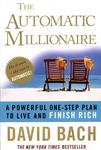| Book review: The Automatic Millionaire – or how to get rich without trying |
Back |
| With the ‘get rich quick’ phenomenon currently taking hold in Ireland, something which is evident by the number of investment clubs and property seminars springing up all over the country, books by American self-help gurus such as the ‘Rich Dad, Poor Dad’ books by Richard T. Kiyosaki, have become increasingly popular. New kid on the block is David Bach, whose new book ‘The Automatic Millionaire’ has just been published in Europe. Bach offers some very good pointers on how to get your money working for you, and how becoming a millionaire is realistic for everyone – provided you think long-term. |
In his fifth book offering financial advice to the masses, David Bach, author of such US bestsellers as ‘Smart Women Finish Rich’, and ‘Smart Couples Finish Rich’, Bach’s aim is to convince that everyone, no matter how small their salary is, has the potential to become a millionaire.
 | | Automatic Millionaire Book Review |
His approach is a sort of American version of ‘take care of the pennies and the pounds will take care of themselves’, and he says that if you save five euros a day, you’ll be a millionaire in 41 years. And you could be a millionaire in 34 years if you save €10 a day!
By focusing on what he calls your ‘latte factor’ - the money you spend everyday on things like fancy drinks and eating out - he says everyone can find this money to save towards being a millionaire.
Bach’s approach to becoming rich is the following:
Secret one - pay yourself first
Right now, before you earn anything, if you are a Pay As You Earn (PAYE) employee, you pay the government income taxes, as well as social insurance, PRSI.
According to Bach, you need to reverse this situation by paying yourself first, and the way to do this is to invest your money tax-free in a pension account.
How much should you pay yourself?
According to Bach, you should follow these guidelines depending on where you are and where you want to go.
• Dead broke: don’t pay yourself first. Spend more than you earn.
• Poor: spend everything you make and save nothing.
• Middle class: pay yourself first five to 10 percent of your income.
• Upper class: pay yourself first 10 to 20 percent of your income.
• Super rich: pay yourself first at least 20 percent of your income.
Secret two - make it automatic
In order to make paying yourself first effective, the process has to be automatic, Bach says, and you must have a system that will pull that money out of your paycheck directly and automatically.
‘It’s not that people are lazy, it’s that they’re busy’, he says. ‘No matter how disciplined people may be, they don’t have time to manually write checks and deposit them into an account every pay day’.
Secret three - buy your home and pay it off early
You’ll never get rich if you don’t own your own home Bach says. And buying a home is just the first step. Bach recommends paying it off as soon as you can.
Example 1
On an average new mortgage in Dublin of €350,000 over 30 years, at an interest rate of 3.3 per cent, a home-owner can expect to pay €201,823.57 back to the bank in interest alone, bringing the total purchase price up to almost €600,000. This is of course provided that that the interest rate holds steady at 3.3 per cent, and as this is unlikely going forward in Europe, one can expect to pay considerably more than this in interest.
Example 2
With €1 million mortgages now becoming so popular in Dublin, that some banks have set up specific divisions to deal with the demand, homeowners with this size of a mortgage can expect to pay a huge amount in interest. Given the same interest rate and term of loan, the projected interest payment will be €576,638.78.
So how can you reduce these huge interest payments? Bach recommends the following:
Pay off your mortgage early by re-adjusting your payment plan so that payments are made every two weeks instead of every month. This results in one extra payment being made each year. If the person in Example 1 was to do this, it would result in interest savings of €27,549.95, and a reduced term of 26.42 years. If the person in Example 2 did it, they would save €78,714.15 in interest and it would shorten the term of the loan by 3.58 years.
Alternatively, you can bump up your payments by 10 per cent each month, or make one extra payment a year to achieve similar results. However, Bach’s philosophy is to ‘make it automatic’ which is why the bi-monthly payments have more chance of success.
With the Government’s Special Savings Incentive Accounts (SSIAs) due to expire from April of next year, savers would do well to consider investing their contributions to this scheme in their mortgage.
Assuming the person with the €350,000 mortgage paid the maximum amount of €254 into their SSIA, they would have approximately €20,000 come next April. If, instead of buying a new car or going on a fancy holiday, they invested this sum in their mortgage, paying down the principal by 20,000, it would result in a saving of €29922.61 in interest, and it would reduce the term by 2.67 years. And if they were to continue paying the €254 against their mortgage each month, they would make additional savings of €39,354.9 and reduce the term by an additional 5.75 years.
Note all calculations in this article were computed on www.bankrates.com |
David Bach, The Automatic Millionaire - Penguin Business. Published May 12th, 2005.
|
| Article appeared in the May 2005 issue.
|
|